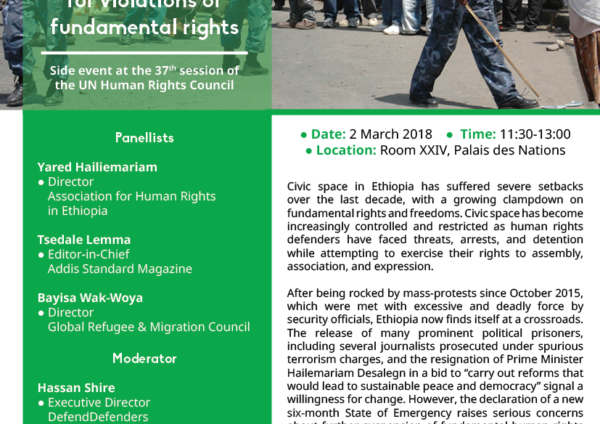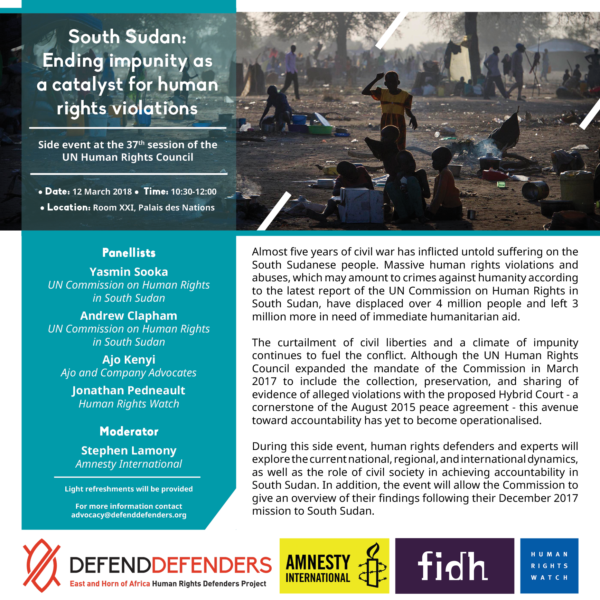Over the past five years, the human rights situation in the East and Horn of Africa has seen a continuous decline. Whether through open conflict or increasing restrictions – both legal and extra-legal – on civic space, the rights of citizens in the sub-region have been violated. Out of the eleven countries under our mandate, just three – Djibouti, Rwanda, and Uganda – weren’t explicitly mentioned by the High Commissioner for Human Rights in his global update to the 37th session of the UN Human Rights Council (UN HRC). Only in Somalia did the High Commissioner note positive change.
After being rocked by mass protests for the past two-and-a-half years, the release of political prisoners and resignation of Prime Minister Hailemariam Desalegn in a bid to carry out reforms sparked hope for progressive change in Ethiopia. However, the wave of arrests of prominent journalists and opposition members under a new six-month state of emergency has raised fresh concerns about the commitment to fundamental rights by this UN HRC Member State.
During a side-event, DefendDefenders (the East and Horn of Africa Human Rights Defenders Project) and its partners launched a new report that examined the current restrictions on civic space in Ethiopia, their historical background, and their impact on the current crises. Prominent human rights defenders (HRDs) voiced their appreciation for the government’s efforts to realise economic, social, and cultural rights but also stressed the importance of an international, impartial, and independent investigation into alleged human rights violations by Ethiopian security forces since October 2015.
International attention to Ethiopia’s human rights situation is mounting. The narrative of Ethiopia’s stability seems to be losing ground, as member and observer states of the UN HRC start voicing concerns about Ethiopia’s crisis, building on the “prevention mandate” of the Council. DefendDefenders will continue advocating for a stronger, collective response to Ethiopia’s human rights record, beyond states’ individual statements of concern.
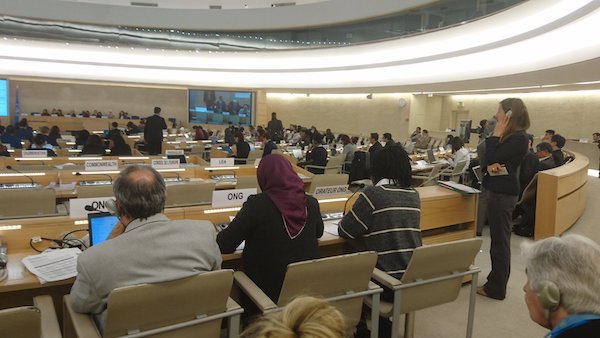
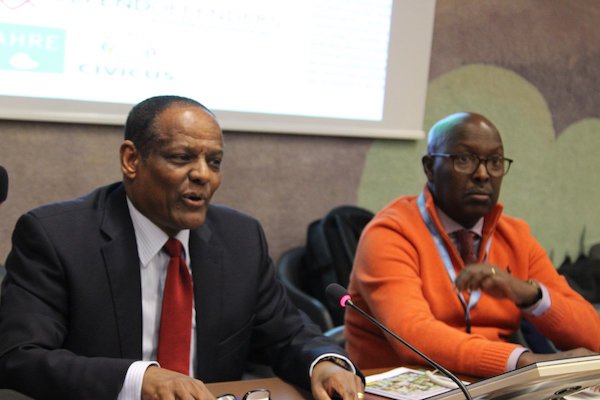
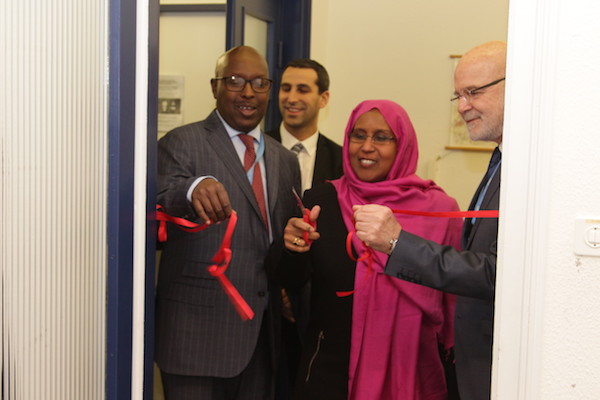
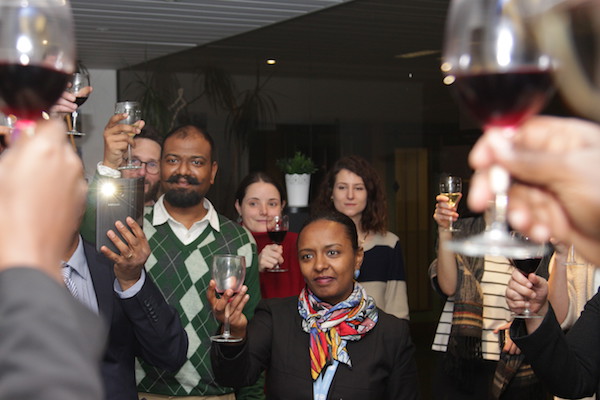
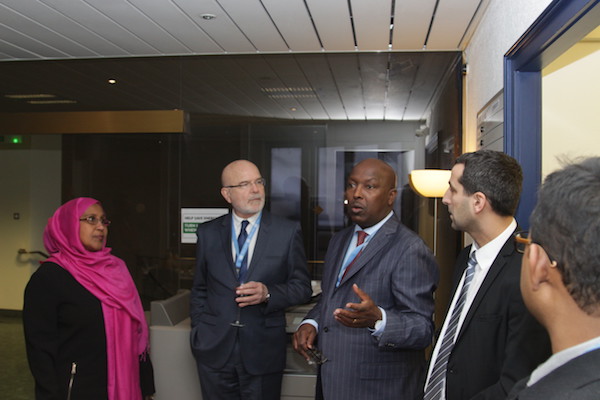
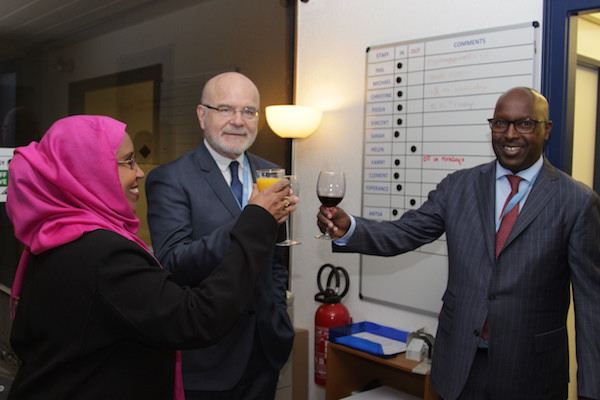
In its second report presented to the UN HRC, the Council-mandated Commission on Human Rights in South Sudan levelled severe accusations of war crimes and possible crimes against humanity committed since the civil war reignited in July 2016. In a second side-event, the members of the Commission, together with HRDs and human rights experts, stressed the importance of ending the climate of impunity that prevails in the country as a way of putting an end to the ongoing violations. DefendDefenders welcomed the decision of the UN HRC to extend and strengthen the mandate of the Commission, as well as the pledge of the South Sudanese delegation to sign a Memorandum of Understanding (MoU) to operationalize the Hybrid Court. However, it is essential that the Government of South Sudan now acts without delay.
The human rights situation in Burundi remains extremely precarious, as was reflected in the Interactive Dialogue with the Commission of Inquiry on Burundi. DefendDefenders has supported Burundian HRDs to attend every session of the UN HRC since the current political crises broke out, in 2015, and will continue to raise their voices until meaningful steps toward de-escalation of the crisis and accountability for violations and abuses have been taken. Similarly, the Eritrean government remains unwilling to engage with the Office of the High Commissioner for Human Rights (OHCHR), despite the damning findings of the Commission of Inquiry on Eritrea, as was manifested by the decision of its delegation to boycott the Interactive Dialogue with the Special Rapporteur on Eritrea.
While these crises require immediate attention by the UN HRC, the East and Horn of Africa has also witnessed worrying, long-term trends of shrinking space for HRDs and civil society. As documented in our bi-annual updates to the African Commission for Human and Peoples’ Rights (ACHPR) and our report “Don’t Shoot the Messenger,” civic space in Tanzania is increasingly restricted, a concern DefendDefenders highlighted in Item 3 and 4 statements.
DefendDefenders and the Pan-African Human Rights Defenders Network also marked another, more positive, milestone with the establishment of a permanent office in Geneva. During a celebratory reception, the office was officially opened by H.E. Fatuma Abdullahi Mohamud, the Somali Permanent Representative to the UN in Geneva and Michel Forst, UN Special Rapporteur on the situation of human rights defenders. DefendDefenders’ Representative to the UN will facilitate the organisation’s engagement with the UN human rights mechanisms on issues relevant to HRDs.
Oral Statements to the Council
Thank you Mr. President.
The East and Horn of Africa Human Rights Defenders Project welcomes the report of the Special Rapporteur on human rights defenders and recognises the vital role of human rights defenders working to protect and promote the rights of people on the move. Although his findings are worrisome they also show a fundamental truth – whenever human rights are violated, people will speak out.
Despite their invaluable role, human rights defenders continue to work at great personal risk. Together with our partners, we have documented at least 137 attacks worldwide in the first 60 days of 2018. These rarely happen in isolation, but are a bellwether for future repression, and we draw your attention to the continued violations committed against human rights defenders in the East and Horn of Africa.
Mr. President, we are particularly concerned with the situation of human rights defenders in Tanzania. Since 2015, the civic space for human rights defenders in Tanzania has shrunk significantly. In August 2017, environmental defender Wayne Lotter was shot and killed in Dar-es-Salaam. Last week, land rights defender Godfrey Luena was attacked and killed outside his home by unknown assailants. The fate of Azory Gwand, a journalist who was disappeared in November 2017, remains unknown. Violations have now spilled over in the political realm, with at least two opposition members being attacked in what the EU mission has described as a threat to democratic values.
Authorities have repeatedly broken up private civil society gatherings and workshops, and since September 2017, at least 55 human rights defenders have been arbitrarily arrested while attending such events. Human rights defenders working on sexual orientation and gender identity issues are themselves at particular risk and, as the government escalates the rhetoric against them, they find both themselves and their constituents cut off from essential services such as healthcare.
The Tanzanian government has made great progress recently, notable in fighting corruption. However, it is essential that it comes to accept human rights defenders as partners in development, rather than view them as adversaries.
I thank you Mr. President.
Thank you Mr. President.
The East and Horn of Africa Human Rights Defenders Project welcomes the report of the Special Rapporteur on human rights defenders and recognises the vital role of human rights defenders working to protect and promote the rights of people on the move. Although his findings are worrisome they also show a fundamental truth – whenever human rights are violated, people will speak out.
Despite their invaluable role, human rights defenders continue to work at great personal risk. Together with our partners, we have documented at least 137 attacks worldwide in the first 60 days of 2018. These rarely happen in isolation, but are a bellwether for future repression, and we draw your attention to the continued violations committed against human rights defenders in the East and Horn of Africa.
Mr. President, we are particularly concerned with the situation of human rights defenders in Tanzania. Since 2015, the civic space for human rights defenders in Tanzania has shrunk significantly. In August 2017, environmental defender Wayne Lotter was shot and killed in Dar-es-Salaam. Last week, land rights defender Godfrey Luena was attacked and killed outside his home by unknown assailants. The fate of Azory Gwand, a journalist who was disappeared in November 2017, remains unknown. Violations have now spilled over in the political realm, with at least two opposition members being attacked in what the EU mission has described as a threat to democratic values.
Authorities have repeatedly broken up private civil society gatherings and workshops, and since September 2017, at least 55 human rights defenders have been arbitrarily arrested while attending such events. Human rights defenders working on sexual orientation and gender identity issues are themselves at particular risk and, as the government escalates the rhetoric against them, they find both themselves and their constituents cut off from essential services such as healthcare.
The Tanzanian government has made great progress recently, notable in fighting corruption. However, it is essential that it comes to accept human rights defenders as partners in development, rather than view them as adversaries.
I thank you Mr. President.
Joint statement by CIVICUS and DefendDefenders
Delivered by Estella Kabachwezi on 12 March 2018
Mr. President, on behalf of CIVICUS, DefendDefenders, Eritrean Law Society, Human Rights Concern Eritrea, Information Forum for Eritrea and One day Seyoum, I would like to thank the Special Rapporteur for her dedication to furthering human rights in Eritrea.
We also thank the panelists of this Enhanced Interactive Dialogue for their contributions. Mr. President, pursuant to resolution L.13, we would like to enquire whether the Office of the High Commissioner can share results of its engagement with the government of Eritrea.
The government of Eritrea was requested to strengthen its cooperation with OHCHR, to communicate pertinent information regarding detained journalists and opposition members, and to consider establishing an office in Eritrea. Has OHCHR seen any progress on any of these requests?
In November 2017, a rare protest broke out in Eritrea at the Al Dia Islamic School in Asmara after a member of the School’s board was arrested following a speech he made criticizing government interference in the private school’s affairs. In the footage that emerged from the scene, dozens of shots could be heard although it is unclear if there were any casualties. No transparent or credible investigation was conducted, and no information emerged about the crackdown, the number of casualties or number of arrests. Was OHCHR able to conduct an investigation into the circumstances of this protest?
The Commission of Inquiry on human rights in Eritrea (COIE) called on the Government of Eritrea to ensure accountability for past and persistent human rights violations, amounting to crimes against humanity. So far, civil society has not recorded any significant institutional or legal reforms required before the domestic legal system can hold perpetrators of international crimes to account in a fair and transparent manner.
Mr President, we wish to underline our support for the mandate of the Special Rapporteur, and highlight its necessity until a time where the human rights record in Eritrea sees genuine improvements.
Delivered by Mr. Ajo Kenyi on 13 March 2018
Thank you, Mr. President.
The East and Horn of Africa Human Rights Defenders Project expresses its gratitude to the Commission. Their findings shine an invaluable light on a protracted conflict where human rights defenders, civil society, and international humanitarian workers are routinely banned from accessing and providing aid to victims.
Human rights defenders in South Sudan struggling to document the ongoing violations are faced with harassment, threats against their life, and reprisals. On the weekend of 24 and 25 February, a civil society leader was reportedly blocked by agents of the National Security Service from travelling to participate in the High-Level Revitalization Forum peace talks, contrary to the terms of the December 2017 Cessation of Hostilities Agreement.
Mr. President,
As the Commission notes in its report, pending the operationalisation of the Hybrid Court, there is no mechanism to ensure accountability for what may amount to crimes against humanity. Although some soldiers have been convicted, civil society reports that the proceedings did not meet international fair trial standards, and no senior officials are on trial. In fact, as the High Commissioner noted during the presentation of his annual report, three generals, identified by Security Council Sanctions Committee as responsible for grave human rights violations, were recently promoted.
Impunity continues to be a catalyst for new violations in South Sudan. Critical evidence, essential for future prosecution, is lost every day. As long as there is no accountability, there can be no hope for lasting peace and reconciliation. We call on the Council to renew and strengthen the mandate to include the identification of individual perpetrators, with a view to future prosecution.
I thank you.
Delivered by Pierre-Claver Mbonimpa on 13 March 2018
Thank you Mme. President.
DefendDefenders and the Association Burundaise pour la Protection des Droits Humains et des Personnes Détenues thank the Commission of Inquiry for their oral update. As a Burundian, I appreciate the tireless work of the Commission in documenting the human rights violations that affect my people.
Mme. President, it will soon be three years since Burundi plunged into a climate of fear and violence. Extra-judicial killings, torture, enforced disappearances and arbitrary detentions of citizens affect all sectors of Burundian society. The media, the judiciary, civil society, and all other voices critical of the government are brutally attacked. Almost all independent human rights defenders and journalists have been forced into exile, where they still live in fear. To this day, Germain Rukuki, Emmanuel Nshimirimana, Aimé Constant Gatore, Marius Nizigama, and Nestor Nibitanga are detained because of their human rights work.
In its first report, the Commission of Inquiry concluded that there are reasonable grounds to believe that crimes against humanity have been committed. We reiterate our concern of about these violations, which continue to be perpetrated with impunity. The current context, with a controversial pending constitutional referendum and a complete denial on the part of the government regarding the situation in the country, offers little hope of improvement.
Mme. President, in light of the gross violations committed by the Government of Burundi and its complete and continued refusal to engage with OHCHR mechanisms, we urge the Council to act, maintain its credibility, and urge Burundi to respect its responsibilities as a member state.
Thank you Mme. President
Delivered by Estella Kabachwezi on 14 March 2018
Thank you Mr. President.
The human rights situation in the East and Horn of Africa remains extremely precarious: of the eleven countries where our organisation works, six are currently the subject of country specific mechanisms mandated by this Council. This, however, cannot distract us from other alarming trends, and we thank the High Commissioner for voicing his concern about the situations in Ethiopia and Tanzania in his global update.
After being rocked by mass-protests for the last two years, Ethiopia finds itself at a critical junction. We welcome the release of several political prisoners as a sign of the Ethiopia’s willingness for progressive reform. However, the declaration of a new State of Emergency raises serious concerns about the Government’s commitment to fundamental human rights. On 8 March prominent blogger Seyoum Teshome was arrested and remains in detention. A thorough, impartial, independent, and international investigation into alleged human rights violations is essential in paving a path forward for all Ethiopians.
Since a new administration took power in 2015, civic space has shrunk dramatically in Tanzania. In the past year alone, at least 55 human rights defenders have been arbitrarily arrested while attending private gatherings, and two environmental activists have been killed. The violence has spilled over in the political realm, with two opposition leaders killed in February 2018.
In 2017, four newspapers were suspended for periods ranging between 3 and 24 months for allegedly violating journalistic ethics. On 2 January 2018, five television stations were fined a total of $27,000 US dollars for broadcasting “offensive and unethical content,” after airing a press statement issued by the prominent Legal Human Rights Centre.
Mr. President,
We call upon this Council to remind Ethiopia – a Member State of this Council – and Tanzania that civil society is an ally, not an adversary, in achieving the sustainable development goals.
I thank you.
RE: Renewing and strengthening the mandate of the Commission on Human Rights in South Sudan to ensure accountability for gross violations of human rights and related crimes in South Sudan
DefendDefenders opens permanent office in Geneva
South Sudan: One small step for the United Nations, one giant leap for the victims
Ethiopia: The role of the international community in ending impunity and ensuring accountability for violations of fundamental rights
South Sudan: Ending impunity as a catalyst for human rights violations
Briefing papers and press releases
To Permanent Representatives of Member and Observer States of the United Nations Human Rights Council, Geneva
RE: Renewing and strengthening the mandate of the Commission on Human Rights in South Sudan to ensure accountability for gross violations of human rights and related crimes in South Sudan
Excellencies,
We, the undersigned national, regional and international non-governmental organisations, write to call on your delegation to renew and strengthen the mandate of the UN Commission on Human Rights in South Sudan (the Commission), during the 37th session of the UN Human Rights Council (HRC) in March. It is essential that the Commission continues its vital work to collect and preserve evidence of gross human rights violations, abuses and related crimes, with a view to end impunity and ensure accountability. The HRC should also strengthen the resolution to make explicit that the mandate of the Commission includes the identification of individual perpetrators, with a view to enable future prosecutions.
The civil war in South Sudan broke out on 15 December 2013 in Juba, quickly spreading north. By the end of 2015, conflict had spread throughout the western and southern Equatorias region. Although the parties to the conflict signed a peace agreement in August 2015, major fighting resumed in July 2016 when the Sudan Peoples’ Liberation Army (SPLA) and opposition soldiers clashed in Juba, resulting in the loss of civilian lives, looting of civilian property, and further displacement of civilians.
According to the UN Office for the Coordination of Humanitarian Affairs (OCHA), over 4 million South Sudanese have been displaced since 2013, including 1.9 million people who have been internally displaced. In 2017 alone, 700,000 South Sudanese fled as refugees to neighbouring countries. OCHA further reports that 7 million South Sudanese need assistance and protection.
After the Commission’s visit to South Sudan in December 2017, Commissioner Clapham expressed concern at the increased levels of violations and abuses, including sexual violence, committed by the parties against civilians. He noted that the “atrocities and the violations are no longer confined to a few parts of South Sudan but are rather spread across the entire country.”
The Commissioners renewed their call for perpetrators of the widespread human rights violations to be brought to justice. Commissioner Yasmin Sooka emphasised the immediate need to establish the Hybrid Court and the Commission on Truth, Healing and Reconciliation. Although the South Sudan Council of Ministers reportedly approved the Hybrid Court statute and the government’s Memorandum of Understanding (MOU) with the African Union, the South Sudanese government is yet to take further steps to operationalise the Court.
Regional actors have also voiced frustration and concern over the continued violations of human rights and international humanitarian law. In January, the Intergovernmental Authority on Development (IGAD) expressed frustrations with the parties’ failure to comply with the Agreement on Cessation of Hostilities, Protection of Civilians, and Humanitarian Access and their violations of international human rights and humanitarian laws. IGAD’s Council of Ministers resolved “to take all necessary measures including targeted sanctions against individual violators and spoilers of the peace agreement.”
In addition, during the 30th ordinary session of the African Union (AU) summit, Moussa Faki Mahamat, AU Commission Chairperson reiterated the support of the AU to IGAD to impose sanctions on leaders violating the ceasefire agreements. “In South Sudan, how can we not repeat that we cannot understand the insane violence that the belligerents inflict, with indescribable cruelty, on a population that has suffered too much. The time has come to impose sanctions on those who obstruct peace”. On 2 February 2018, the United States of America imposed a unilateral arms embargo on the country.
With the violence ongoing, and in the absence of another international mechanism to monitor and document human rights violations and abuses, and pending the establishment and operationalisation of the Hybrid Court, the Commission’s role is vital. Moreover, the Commission might be needed even when the Court is established. Our organisations urge the UN HRC to take strong and meaningful action during its 37th Session to enhance the Commission’s mandate and enable it to support justice, truth, and reparation for the victims of the grave human rights violations committed in South Sudan
We call on all Member States to adopt a resolution that:
- Renews the mandate of the Commission to conduct independent investigations into alleged violations of international human rights and humanitarian law, collect and preserve evidence of gross human rights violations and abuses and related crimes, with a view to ending impunity and ensuring accountability, with a particular focus on sexual and gender-based crimes, and attacks or reprisals against human rights defenders;
- Strengthens the language on accountability to make explicit that the mandate of the Commission includes the identification of individual perpetrators, with a view to future prosecutions.
- Urges the Government of South Sudan to allow and facilitate access to all locations and persons of interest to the Commission;
- Requests that the report of the Commission be transmitted to the AU Commission in order to support and inform future investigations of the Hybrid Court for South Sudan and the UN Security Council for consideration and further action;
- Encourages the AU to take immediate steps to establish the Hybrid Court for South Sudan as recommended by the AU Commission of Inquiry on South Sudan, and provided for in the 2015 peace agreement;
- Urges all States to encourage further concrete action to deter and address on-going violations of international human rights and humanitarian law at the UN Security Council.
We thank you for your attention to these pressing issues.
Sincerely,
- African Centre for Democracy and Human Rights Studies (The Gambia)
- Association for Human Rights in Ethiopia
- Burundian Coalition of Human Rights Defenders (CBDDH)
- CIVICUS
- Community Empowerment for Progress Organisation (South Sudan)
- DefendDefenders (East and Horn of Africa Human Rights Defenders Project)
- End Impunity Organisation (South Sudan)
- Eritrean Law Society
- Eve Organisation for Women Development (South Sudan)
- Global Centre for the Responsibility to Protect
- Global Society Initiative for Peace and Democracy (South Sudan)
- Human Rights Centre Somaliland
- Human Rights Watch
- International Federation for Human Rights (FIDH)
- International Refugee Rights Initiative
- International Service for Human Rights (ISHR)
- International Youth for Africa (South Sudan)
- Pan African Human Rights Defenders Network
- South Sudan Christian Community Agency
- South Sudan Human Rights Society for Advocacy
- South Sudan Law Society
- Tanzania Human Rights Defenders Coalition
- West African Human Rights Defenders Network (Togo)
- Women Monthly Forum (South Sudan)
Almost six years after acquiring special consultative status with the United Nations (UN) Economic and Social Council, DefendDefenders (the East and Horn of Africa Human Rights Defenders Project) is proud to announce the establishment of a permanent representation in Geneva. During a celebratory reception on 2 March, the office was officially opened by H.E. Fatuma Abdullahi Mohamud, the Somali Permanent Representative to the UN in Geneva and Michel Forst, UN Special Rapporteur on the situation of human rights defenders. DefendDefenders’ Representative to the UN will facilitate the organisation’s engagement with the UN human rights mechanisms on issues relevant to human rights defenders (HRDs).
Strategic advocacy has proven essential to mitigate the risks that HRDs in the East and Horn of Africa face on a daily basis. Since its founding in 2005, DefendDefenders, which also serves as the secretariat of the Pan-African Human Rights Defenders Network (PAHRDN), has supported HRDs from all over Africa to attend sessions of regional and international human rights mechanisms, where they engage with key stakeholders, decision makers, and duty holders on pressing human rights issues in the sub-region.
“The launch of our Geneva office is a milestone in the development of DefendDefenders and PAHRDN,” said Executive Director Hassan Shire at the official launch today. “This permanent presence enables us to engage more effectively with the UN Human Rights Council (UN HRC), its mechanisms, and the Office of the High Commissioner on Human Rights. It is another important step towards ensuring that the voices of HRDs from the East and Horn of Africa are heard at one of the world’s premiere human rights forums.”
The human rights situation in the East and Horn of Africa remains extremely precarious, something that is reflected in the actions of the UN HRC. The mandate of two out of only five of Commissions of Inquiry ever to be established by the UN HRC covers countries in the sub-region. Both the Commissions of Inquiry on Eritrea and Burundi found that there are reasonable grounds to believe that crimes against humanity have been, and continue to be committed, in these respective countries.
Meanwhile, the current mandates of the Commission on situation of human rights in South Sudan and the Special Rapporteur on the situation of human rights in Eritrea continue to fulfil an invaluable role in documenting ongoing violations and exploring avenues of future accountability. Other special mechanisms, most notably the Special Rapporteurs on human rights defenders, peaceful assembly and association, and freedom of expression, have provided invaluable support as we endeavor to strengthen the work of HRDs.
DefendDefenders remains committed to its core mandate of providing emergency support to HRDs from the sub-region facing immediate risk. With the establishment of our Geneva office, we endeavor to move one step closer to a world where HRDs can carry out their legitimate work safely, and without fear of reprisals.
South Sudanese victims of atrocities are a step closer to redress. Today, the UN Human Rights Council (UN HRC) helped them close the justice gap by putting perpetrators on notice that impunity will not prevail. The Council unanimously adopted a resolution that extends the mandate of the UN Commission on Human Rights in South Sudan (the Commission) for one year, enables it to identify those responsible for crimes, and share this information with relevant justice mechanisms. DefendDefenders (the East and Horn of Africa Human Rights Defenders Project) welcomes this step forward and reminds all stakeholders that lasting peace will not be achieved without justice.
“The Commission now enjoys one of the broadest mandates ever given to a UN investigating body,” said Hassan Shire, Executive Director of DefendDefenders today. “The resolution, just adopted by the UN’s top human rights body, gives an additional push to regional efforts toward ending impunity. The African Union should continue to urge South Sudan’s government to set up a Hybrid Court tasked with trying those accused of war crimes, crimes against humanity, and other violations.”
The UN HRC has been monitoring the human rights situation in South Sudan since civil war broke out in December 2013. In March 2016, it established the Commission—a team of independent UN investigators—and subsequently extended its mandate in March 2017. With today’s resolution, the Commission enjoys a broader mandate which includes monitoring and reporting on the human rights situation; collecting and preserving evidence of, and clarifying responsibility for gross violations and abuses of human rights, and making such information available to all transitional justice mechanisms; as well as providing guidance on transitional justice, accountability, reconciliation, and healing.
The African Union and the East African Intergovernmental Authority on Development (IGAD) have also exerted intense pressure over Juba’s authorities through the facilitation of peace talks, calls for a ceasefire, the establishment of a Commission of Inquiry, and issuing communiqués, including calls on South Sudan’s government to sign an agreement on the establishment of a Hybrid Court.
In its last report, the UN Commission found that some of the crimes committed in South Sudan may amount to war crimes and crimes against humanity, highlighting attacks against civilians on the basis of their ethnic identity, killings, abductions, torture, rape, gang rape and other forms of sexual and gender-based violence, deliberate denial of food, looting and destruction of villages, violence against children, recruitment of child soldiers, and attacks on schools and hospitals. In today’s resolution, the UN HRC echoed concerns over “ethnically motivated incitement to hatred and violence” and the fact that the situation “continues to be characterized by impunity.”
The government of South Sudan should immediately sign the Memorandum of Understanding (MoU) establishing a Hybrid (i.e., composed of national and African Union magistrates) Court to investigate and prosecute those responsible for human rights violations and abuses committed in relation to the conflict, as urged on several occasions by the African Union Peace and Security Council. The MoU is ready for signature, and there is no excuse to further delay it.
The UN HRC will publicly discuss the situation in South Sudan at its September 2018 and March 2019 sessions, and has deliberately left the door open to further extend the Commission’s mandate. Maximum pressure is now on Juba. The government of South Sudan should demonstrate responsibility and put an end to the cycle of impunity in the country, which fuels both the conflict and egregious human rights abuses.
Résolutions
A/HRC/37/L.10 extend the mandate of the Special Rapporteur on the right to privacy for a period of three years.
A/HRC/37/L.40 extends the mandate of the UN Commission on Human Rights in South Sudan for one year and enables it to identify those responsible for crimes, and share this information with relevant justice mechanisms.


